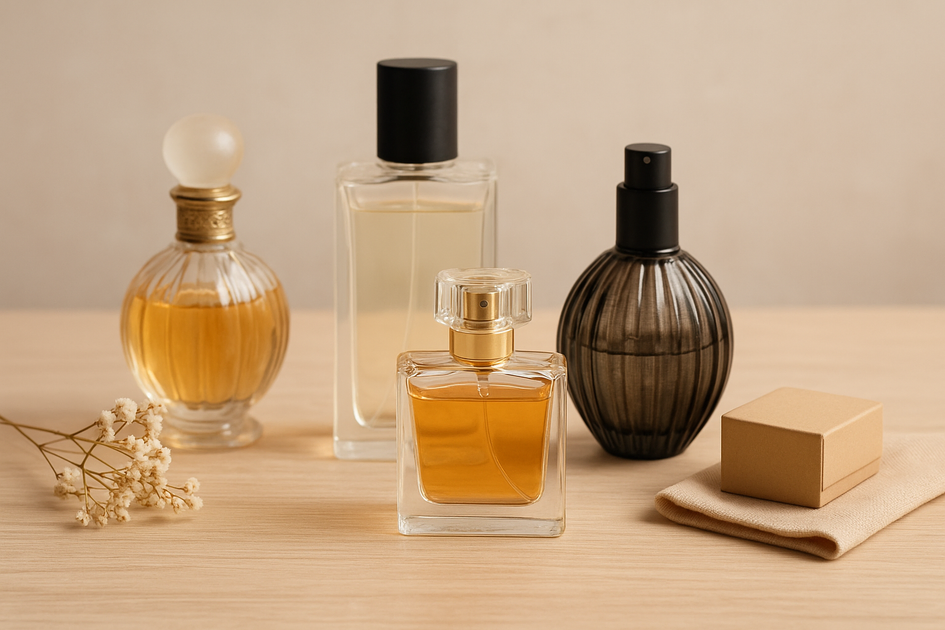A well-cared for perfume can last decades while maintaining its original quality and character. Proper storage and handling are essential to preserve your fragrance investment. Here we teach you the professional techniques to preserve your collection for generations.
Factors that deteriorate perfumes
Understanding what damages perfumes is the first step to protecting them:
Sunlight: UV rays break down fragrance molecules and alter the composition
Heat: Accelerates chemical reactions and can cause the perfume to spoil
Humidity: Can cause mold growth and alter the fragrance's chemical balance
Oxygen: Oxidizes ingredients over time, changing the scent profile
Temperature fluctuations: Cause expansion and contraction that can damage the bottle
Air exposure: Evaporation and oxidation when bottles are not properly sealedOptimal storage conditionsLocation requirements
1. Ideal location: Cool, dry, and dark place
2. Temperature: Between 15-25°C (59-77°F)
3. Humidity: Below 70% relative humidity
4. Light: Complete darkness or very low light
5. Air circulation: Well-ventilated but not drafty
Best storage locations
Bedroom closet: Away from windows and heat sources
Dresser drawer: Dark and temperature-stable
Wine cellar: If you have one, the conditions are perfect
Storage box: In a cool, dark placeAvoid these locations
Bathroom: High humidity and temperature fluctuations
Kitchen: Heat, humidity, and cooking odors
Windowsill: Direct sunlight and temperature changes
Car: Extreme temperature variations
Refrigerator: Too cold and can cause condensationProper bottle handlingPositioning
Keep bottles upright: Prevents leakage and maintains seal integrity
Avoid shaking: Unnecessary agitation can alter the fragrance
Handle gently: Rough handling can damage the spray mechanismSealing
Always close tightly: Prevents evaporation and oxidation
Check seals regularly: Ensure caps and sprayers are secure
Use original packaging: Boxes provide additional protectionCommon mistakes to avoid
Storing in the bathroom: Humidity and heat damage fragrances
Exposing to direct light: UV rays degrade fragrance molecules
Leaving bottles open: Causes evaporation and oxidation
Shaking bottles unnecessarily: Can alter the fragrance composition
Storing near heat sources: Accelerates chemical degradation
Using expired fragrances: Can cause skin irritationPerfume shelf life by concentration
Understanding how long different types of perfumes last:
Eau de Cologne (EDC): 2-3 years
Eau de Toilette (EDT): 3-5 years
Eau de Parfum (EDP): 5-8 years
Parfum/Extrait: 8-15 years
Pure perfume oil: 15-20 yearsSigns that your perfume has gone bad
Color change: Darkening or unusual discoloration
Texture change: Separation or unusual consistency
Scent alteration: Sharp, sour, or unpleasant odors
Reduced longevity: Fragrance doesn't last as long on skin
Skin irritation: Burning or itching when appliedProfessional preservation techniquesFor vintage fragrances
Store in original boxes when possible
Use archival-quality storage materials
Monitor temperature and humidity regularly
Consider professional restoration for very old fragrancesFor limited editions
Keep original packaging intact
Document purchase date and batch numbers
Store in climate-controlled environment
Avoid opening unless necessaryTravel and transport tips
Use travel atomizers: Smaller bottles reduce exposure
Pack carefully: Wrap bottles in bubble wrap or cloth
Avoid checked luggage: Temperature and pressure changes can damage fragrances
Keep in carry-on: Better temperature control
Use protective cases: Prevent breakage and light exposureInvestment and collection managementFor collectors
Document your collection: Keep records of purchase dates and batch numbers
Rotate usage: Use different fragrances to prevent any from sitting too long
Monitor conditions: Regular checks for signs of deterioration
Insurance: Consider insuring valuable collectionsFor casual users
Buy smaller sizes: Use up fragrances before they deteriorate
Store properly: Even inexpensive fragrances benefit from good care
Regular use: Fragrances last longer when used regularlyConclusion
With proper care, your perfumes can become family treasures that maintain their magic for generations. The key is consistency in storage conditions and gentle handling. Remember that perfume is not just a fragrance—it's an investment in memories and personal expression.
Maintenance checklist
[ ] Store in cool, dark, dry location
[ ] Keep bottles upright and tightly sealed
[ ] Avoid temperature fluctuations
[ ] Monitor for signs of deterioration
[ ] Use fragrances regularly
[ ] Document collection details
[ ] Handle bottles gently
[ ] Keep original packaging when possible
